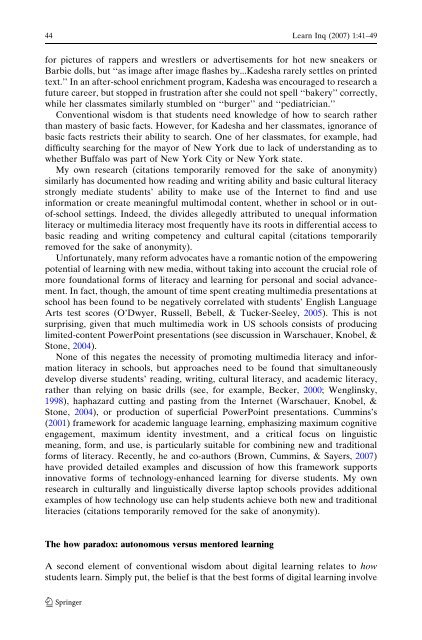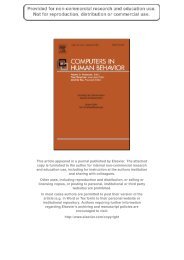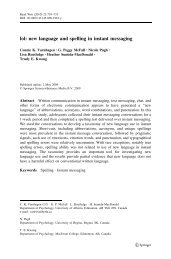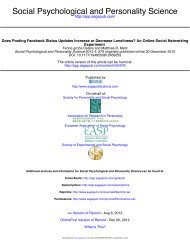Warschauer.pdf
You also want an ePaper? Increase the reach of your titles
YUMPU automatically turns print PDFs into web optimized ePapers that Google loves.
44 Learn Inq (2007) 1:41–49<br />
for pictures of rappers and wrestlers or advertisements for hot new sneakers or<br />
Barbie dolls, but ‘‘as image after image flashes by...Kadesha rarely settles on printed<br />
text.’’ In an after-school enrichment program, Kadesha was encouraged to research a<br />
future career, but stopped in frustration after she could not spell ‘‘bakery’’ correctly,<br />
while her classmates similarly stumbled on ‘‘burger’’ and ‘‘pediatrician.’’<br />
Conventional wisdom is that students need knowledge of how to search rather<br />
than mastery of basic facts. However, for Kadesha and her classmates, ignorance of<br />
basic facts restricts their ability to search. One of her classmates, for example, had<br />
difficulty searching for the mayor of New York due to lack of understanding as to<br />
whether Buffalo was part of New York City or New York state.<br />
My own research (citations temporarily removed for the sake of anonymity)<br />
similarly has documented how reading and writing ability and basic cultural literacy<br />
strongly mediate students’ ability to make use of the Internet to find and use<br />
information or create meaningful multimodal content, whether in school or in outof-school<br />
settings. Indeed, the divides allegedly attributed to unequal information<br />
literacy or multimedia literacy most frequently have its roots in differential access to<br />
basic reading and writing competency and cultural capital (citations temporarily<br />
removed for the sake of anonymity).<br />
Unfortunately, many reform advocates have a romantic notion of the empowering<br />
potential of learning with new media, without taking into account the crucial role of<br />
more foundational forms of literacy and learning for personal and social advancement.<br />
In fact, though, the amount of time spent creating multimedia presentations at<br />
school has been found to be negatively correlated with students’ English Language<br />
Arts test scores (O’Dwyer, Russell, Bebell, & Tucker-Seeley, 2005). This is not<br />
surprising, given that much multimedia work in US schools consists of producing<br />
limited-content PowerPoint presentations (see discussion in <strong>Warschauer</strong>, Knobel, &<br />
Stone, 2004).<br />
None of this negates the necessity of promoting multimedia literacy and information<br />
literacy in schools, but approaches need to be found that simultaneously<br />
develop diverse students’ reading, writing, cultural literacy, and academic literacy,<br />
rather than relying on basic drills (see, for example, Becker, 2000; Wenglinsky,<br />
1998), haphazard cutting and pasting from the Internet (<strong>Warschauer</strong>, Knobel, &<br />
Stone, 2004), or production of superficial PowerPoint presentations. Cummins’s<br />
(2001) framework for academic language learning, emphasizing maximum cognitive<br />
engagement, maximum identity investment, and a critical focus on linguistic<br />
meaning, form, and use, is particularly suitable for combining new and traditional<br />
forms of literacy. Recently, he and co-authors (Brown, Cummins, & Sayers, 2007)<br />
have provided detailed examples and discussion of how this framework supports<br />
innovative forms of technology-enhanced learning for diverse students. My own<br />
research in culturally and linguistically diverse laptop schools provides additional<br />
examples of how technology use can help students achieve both new and traditional<br />
literacies (citations temporarily removed for the sake of anonymity).<br />
The how paradox: autonomous versus mentored learning<br />
A second element of conventional wisdom about digital learning relates to how<br />
students learn. Simply put, the belief is that the best forms of digital learning involve<br />
123
















